|
| Tomorrow night, the Richmond City Council will vote on resolutions apposing Measures N and O. For those of you who are not already tired of hearing about Measures N and O, following is press coverage dating from back in 2015 to just a few hours ago. A growing number of organizations are opposing N and/or O, including the Richmond Progressive Alliance, TRAC (Trails for Richmond Action Committee) and the Greenbelt Alliance.
The backer of the two measures, Richard Poe, is trying to line up supporters by lying to them that he will build, “Middle-class housing, and one acre of land donated to support affordable housing for teachers.” There is no evidence that such a project exists or that Poe has made any tangible effort to provide affordable housing for teachers. Poe also apparently tried to unsuccessfully fool the United Teachers of Richmond (UTR) into supporting his measures in exchange for supporting a renewal of the WCCUSD parcel tax.
Richmond Progressive Alliance
http://richmondprogressivealliance.net/issues/Development.html
Stop developers from buying bypasses & defend General Plan
RPA opposes "Richmond Riviera" ballot measure
The following statement was drafted and approved by the RPA Steering Committee and presented to and endorsed by the membership at the December meeting:
The Richmond Progressive Alliance strongly opposes the "Richmond Riviera" ballot measure scheduled to come before the voters next June. We oppose this measure because it undermines the ability of our community to determine and realize our vision for our city. Over several years Richmond has developed a General Plan to expand housing here, to meet the needs of the community and at the same time improve the quality of our lives by paying attention to the air we breathe, transit and traffic, the shoreline and parks, and our tax base. The General Plan should not be pushed aside simply to meet the desires of a developer of a particular area.
The "Richmond Riviera" item came to the City Council in November 2015 because developer Richard Poe had paid signature-gatherers to get a qualifying number of signatures on a petition for a revision of the General Plan. The revision would allow his development company to build a specific project on Ford Point (next to the Craneway and forthcoming Ferry Terminal). There are many objections to the content of the proposal, including density, design, and setbacks.
Even more importantly, we have a process for approving specific projects that involves formal Design Review, the Planning Commission, and the City Council, as well as processes for making changes in our General Plan. Just as we reject the idea of giving in to developers who buy lobbyists or special favors, we reject the idea that these community processes should be bypassed by developers who have the money to pay for signature gatherers and can thereby force the City to either agree to a project as they propose it or face the expense of putting it on the ballot. If the Richmond Riviera project were to succeed in the June primary, it would open the door for every developer who wanted to bypass Richmond's development approval process.
The initiative procedure is not appropriate for these kinds of complicated decisions. Voters will be asked simply to vote yes/no on 12 pages of legal documents with modifications to the General Plan, zoning changes, and a development agreement with the City that would not be subject to any future modification or negotiation. (See Item L2 of City Council agenda for 11/17/15, including the initiative and the staff's response to it at http://sireweb.ci.richmond.ca.us/sirepub/agdocs.aspx?doctype=agenda&itemid=51486.)
We ask Richmond voters to decisively turn down this initiative and to close one door that allows big money to control our politics.
We note that some of the support for Poe's project exists because some Richmond residents have lost confidence in the Richmond Planning Department. The planning function of the City is vital to our future and full democratic control must be restored. But it will not be helped by turning over control of planning decisions to those who have enough money for signature-gathering and then running expensive PR campaigns.
City Manager’s Compensation: https://www.facebook.com/RPA4Richmond/posts/1047818901916785
One of the petitions seeks to set a limit of five times the median income in Richmond ($54,589) on the City Manager’s compensation. According to the Transparent California website, in 2013 Lindsay made $288,372 in wages plus $123,600 in total benefits, which adds up to a total of $411,972. The City also reported this figure in February of 2015.
The City Manager position is almost universally a highly paid one, and compensation for Richmond (which includes salary and benefits) is based on current levels in the Bay Area. While it could be argued that city manager salaries in general are too high, the compensation the City Council has negotiated for our current City Manager is not out of line with regional levels.
Having worked with Bill Lindsay for almost 11 years now (including working very closely with him during the eight years I was mayor), I have found him to be highly knowledgeable and capable, as well as highly dedicated to carrying out the policies set by the City Council on behalf of our community. It is clear that progressives in Richmond can and should feel that we can work with Bill Lindsay to help further the City’s healthy, sustainable, democratic and just orientation that is our fervent aim and desire.
The City Manager’s compensation has always been negotiated by the City Council, and the RPA feels that this approach should continue. We oppose the petition that has been circulated and will continue to oppose it, should the petition have enough valid signatures to be put before the voters.
Greenbelt Alliance
http://www.greenbelt.org/blog/election-2016-vote-no-measure-n-richmond/
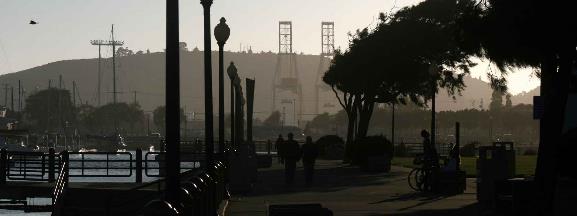
April 29, 2016 by Matt Vander Sluis
Election 2016: Vote NO on Measure N in Richmond
This June, residents in the City of Richmond will be asked to weigh in on Measure N—a developer-drafted ballot measure that would overturn the City’s plans for compact infill development along the waterfront and instead approve an inefficient, unsustainable development project. Greenbelt Alliance urges the residents of Richmond to vote NO on Measure N.
In 2012, Richmond adopted a smart general plan which calls for the area along the waterfront near Marina Bay to become a walkable neighborhood with new homes, shops, and entertainment. There are also plans for a new ferry terminal to zip residents to and from their jobs without traffic or congestion. This area is surrounded by a growing economic center that includes the Craneway Pavilion—a historic, 45,000-square-foot event center, waterfront restaurants, and the Rosie the Riveter WWII Home Front National Historical Park.
Now, a local developer is trying to convince voters to throw out this sustainable vision and lock in approvals for his own project, called the “Richmond Riviera,” which dramatically slashes the number of new homes from 625 to 59, and turns a walkable neighborhood into auto-oriented sprawl.
Greenbelt Alliance, city staff, city councilmembers, and community groups have raised significant concerns about the developer’s project including:
- Increasing car use, traffic, and pollution
- Negative impacts on the revitalization of the waterfront
- Undermining the viability of the nearby ferry terminal, slated to open in 2018
- Negative effects on city revenue
If Measure N passes, it would set a dangerous precedent. It would overturn the city’s vision and approve the developer’s project outright—eliminating any opportunities for public input.
Richmond already has a great plan for creating a thriving and vibrant neighborhood around its new ferry terminal—don’t let Measure N derail those plans. This June, vote NO on Measure N in the City of Richmond!
East Bay Express
http://www.eastbayexpress.com/oakland/richmond-developer-pushes-two-ballot-measures/Content?oid=4572411
Richmond Developer Pushes Two Ballot Measures
Sensing that the city would reject his suburban-style housing project along the waterfront, Richard Poe is taking his proposal to the voters. He also wants to slash the city manager's pay.
By John Geluardi
Richard Poe, a wealthy and politically active developer, walked up to the podium at a recent Richmond City Council meeting with his wife and three-year-old son in tow. While Poe's son did his best to hold up an enlarged, sweepstakes-style check made out for $2 million, Poe began to ramble disjointedly about an unnamed development project, petitions, negativity, phases, and solar panels. Through the maze of non-sequiturs, Poe seemed to be saying that he would give the city a $2 million up-front payment if the council awarded him preferential treatment and allowed his proposed project to skip the city's normal vetting and approval process.
"As you know," Poe told the councilmembers, "most developers pay as they go, but we pay in advance."
While Poe's short speech was difficult to follow at times, councilmembers had little doubt that he was talking about his so-called "Richmond Riviera" project, a controversial proposal to build 59 upscale, single-family homes on land that he owns on Richmond's waterfront. Poe completed his application for his suburban-style project in September 2014, according to city documents. But in February, just before the city's design review board was going to consider the proposal, Poe pulled his application and announced he would instead seek voter-approval for it.
Poe has since pushed a signature-gathering effort that qualified the petition for the November 2016 ballot. The measure calls for altering the city's general plan — a document that took years of work and reflects the input of thousands of Richmond residents — to suit Poe's desires. And in another apparent attempt to exert his personal interests on city politics, Poe has funded a petition drive calling for a reduction in City Manager Bill Lindsay's salary and benefits. The county is still verifying the signatures on that petition.
This is not the first time that Poe, scion of the wealthy real estate family that oversaw the development of Richmond Marina, has used his wealth to get want he wants in Richmond. Last year, a subsidiary of one of Poe's companies and another developer funded a hit-piece mailer campaign attacking Measure C, which sought to establish a property tax to keep the financially struggling Doctors Medical Center from closing. Measure C failed, in part due to Poe's efforts, and the only hospital that served working-class and low-income families in the western part of Contra Costa County shuttered its doors in April. Poe has also formed shadowy political committees to influence Richmond council elections and has commissioned polls that always seem to determine Richmond voters are remarkably in line with his interests. Poe is also known to launch expensive glossy mailer campaigns attacking city officials who cross him.
Citing Poe's vindictiveness, numerous city officials and residents asked their names not be used in this story. Poe did not return calls or emails requesting comment.
A possible reason for why Poe put his proposed Richmond Riviera project on the ballot is because he sensed the council was not happy with it in light of the city's plan for dense urban development at that location. The five-acre site has been designated as an "activity zone" in the city's general plan, which the council adopted in 2012.
For decades, large, dense developments have bypassed Richmond, while cities like San Francisco, Oakland, Emeryville, and Berkeley have undergone revenue-generating building booms. That's why the Richmond general plan designated Poe's five-acre site as "high intensity mixed use" and zoned the site for structures of up to 135 feet and residential density of up to 625 units. But Poe wants to build 59 expensive, single-family homes with a maximum height of 35 feet. City officials are alarmed with Poe's plan because it would generate far less property tax revenue, and people who purchase suburban-style homes tend to be much less tolerant of noise, traffic, and retail activity, all of which are zoned for the area.
The site is in the middle of a growing economic center that includes the Craneway Pavilion, a historic, 45,000-square-foot event center that hosts wide range of events, from intimate company parties to major music concerts. Next to the Craneway are Assemble Restaurant and the Rosie the Riveter WWII Home Front National Historical Park Visitor Center.
Perhaps most important, a ferry terminal, with direct service to San Francisco, is scheduled to begin operating right next door to Poe's property in 2018. The Water Emergency Transportation Authority, which will operate the ferry, is relying heavily on dense development along the Richmond waterfront to support the ferry with commuters for the seventeen-minute trip to San Francisco. Poe's project might generate eight to ten regular commuters while a denser one could generate hundreds, according to a city official.
Another Richmond developer, whom the Express agreed to not identify, said the ballot measure benefitting Poe could have negative repercussions on development in Richmond. "I have trouble wrapping my mind around why [Poe] would go with less density. His project makes no sense for the location," the developer said. "In my opinion, there's no way he should use the ballot to try and bypass the city's approval process. It's a terrible precedent."
Meanwhile, Poe's petition to lower Lindsay's salary appears to be based on anger and resentment. Lindsay took the city's top administrator job in 2005 at a time when Richmond's reputation was in shambles after decades of corruption, poor financial management, and high crime rates. Lindsay hired all new department heads, including Police Chief Chris Magnus, who reorganized the police department and has spearheaded an unprecedented nine-year decline in violent crime in the city.
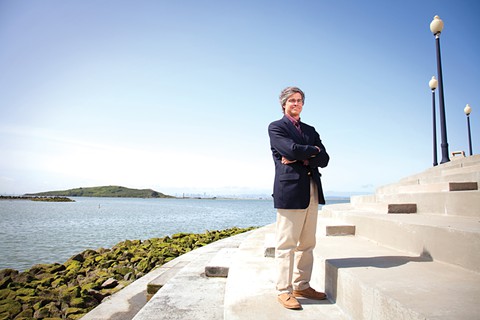
Joseph Schell/File photo
City Manager Bill Lindsay (above) would have his salary slashed by a ballot measure backed by developer Richard Poe, who wants to build a suburban-style housing development on the Richmond waterfront.
Lindsay also set out to transform Richmond's gloomy reputation for being backward and overshadowed by heavy polluting industries into a modern city that is willing to invest in its residents. Lindsay oversaw the updating of the Richmond General Plan 2030, a sweeping policy document that has fifteen elements (in California, cities are only required to have seven). The document, adopted in 2012, will guide the city's future in terms of land use, economic development, transportation, open space conversion, and arts and culture. Richmond's general plan also dedicates an entire element dedicated to community health and wellness — conditions that Richmond's previous administrators and elected officials had neglected.
But Poe is clearly not happy with the plan — or Lindsay. In February, Poe was behind a glossy attack flier that criticized Lindsay's salary, which is just under $412,000, as being more than twice that of Governor Jerry Brown. Poe's ballot petition would limit the city manager's total compensation to a much lower amount based on recent household income figures. The formula would reduce Lindsay's total annual compensation to $272,945, a pay cut that would almost certainly result in Lindsay seeking employment elsewhere.
Mayor Tom Butt, a Lindsay supporter, said Poe's salary formula is nonsensical and does not take into account that cities have different administrative needs based on local commerce, geographic location, poverty rates, and other social issues. "Lindsay is among the best paid city managers in the Bay Area but certainly not at the top. He doesn't even make the top ten list in either pay per resident or pay per city employee," Butt wrote in his email newsletter. "Placing an arbitrary cap on the city manager's compensation has no rational basis, particularly when it is tied to nothing related to the nature of or qualifications for the job."
Poe has portrayed his petition as seeking government fiscal responsibility, but a closer look raises questions about his true motivations. For example, Poe fails to mention that Lindsay's compensation is not even the highest in Richmond. In 2013, Lindsay's salary and benefits came in sixth after five fire captains and a battalion chief, all of whom collected thousands in overtime, city records show.
Moreover, Poe has publicly expressed frustration toward Lindsay and the city for not purchasing one of his buildings to house City Hall. Instead, the city spent $100 million, mostly in bond funds, to renovate the historic Civic Center Plaza. On Nextdoor.com, a social networking site, Poe made plain his contempt for the renovation and for Lindsay. "This was under the watch of this city manager. Indeed, people forget what's in our file, the city could have bought [the building] in Marina Bay that I own for at the time $12 million." Poe wrote on October 10. "I strongly spoke out against the city building what we call a $101 million Taj Mahal ... in Richmond ... . However, those that wanted to waste taxpayers' money branded me as self-serving."
Poe was kicked off Nextdoor last month when network managers discovered his neighborhood, "The Richmond Riviera," did not yet exist and that his main residence is not in the Richmond Marina. According to public records, Poe has identified himself as a resident of Florida for a substantial portion of the past decade. Multiple sources also said that Poe told them that he plans to retire to a newly purchased mansion in Florida.
Clarification: In a comment appended to this story, Richard Poe disputed an assertion made in the original version of this story that he recently purchased a mansion in Florida. The story has been clarified as a result.
East Bay Times
http://www.eastbaytimes.com/richmond/ci_29156890/richmond-developer-wants-residents-not-city-decide-housing
Richmond: Developer wants residents, not city, to decide on housing project
By Karina Ioffee kioffee@bayareanewsgroup.com
Posted: 11/24/2015 06:40:26 AM PST | Updated: 5 months ago
RICHMOND -- A prominent Richmond developer who has failed to get city support for his latest housing project wants residents to decide the matter through a ballot measure next year.
Virtual Development Corp. CEO Richard Poe wants to build 59 single-family homes in Richmond's growing Marina Bay neighborhood. But city planners object, arguing that the project doesn't fit with Richmond's long-term vision for the waterfront area, which it has identified as "a major activity center," with offices, shops and potentially even a hotel all rising to five floors above the ground.
The difference of opinion has unleashed a bitter battle between proponents of Poe's plan, who now include some Marina Bay-area residents and families whose children attend a charter school in the area, and city planners who say Richmond has a unique opportunity to build a more dense project that creates not only more housing but shops and other amenities. The city's plans for the area also are predicated on new ferry service between Richmond and San Francisco, scheduled to start in 2018.
"If people have to drive across town to get on the ferry, they will be less likely to use it," said Richard Mitchell, Richmond's planning director, adding that Poe's housing development would generate no more than 10 ferry users a day. "Marina Bay residents complain that they don't have grocery stores, but they'll never get them if they don't have enough human beings living in the area."
Backers of the Richmond Riviera project have mounted a petition drive to place the project on the ballot. On Tuesday, the City Council can either approve the project as proposed in the petition or order an election, likely in June, at a cost of at least $100,000 to the city. If approved by the council or voters, Poe's project will not be subject to the California Environmental Quality Act (CEQA), the state's landmark environmental law that requires big projects to disclose their environmental impacts and reduce as many of them as possible. Other reviews would also be skipped, according to city attorneys.
"It's a new way to do land use and appalling," Mitchell said. "This is not how we want to do business."
Poe says his project would get a full vetting before being built. He also says he chose the initiative route after spending more than three years in discussions and $1 million in fees to the city.
"It's clear that staff wants to see only one type of development and has a bias toward that," Poe said. "I'm just tired."
Poe, who previously lived in Richmond but now resides in Florida, says he is not opposed to building high-rise buildings per se. He just thinks they are not a good financial investment compared with the single-family homes that would sell for upward of $700,000, netting him an estimated $300,000 per home.
By comparison, the bay's high liquefiable soil makes it expensive to install pilings that would be needed to support a five-story building, increasing costs.
"You can't command the prices for those units the city envisions, so it's our conclusion that this is not the type of project that is economically feasible for us at this time," Poe said.
Each home under Poe's proposal would have solar panels and an energy pack that allows residents to stay off the grid even after the sun sets. To sweeten the deal, Poe has promised to donate land to Amethod Public Schools to build 38 affordable housing units for teachers, earning him instant support from both educators and many families.
But funds for building the new teacher housing would come from in-lieu fees developers pay the city as well as additional funds from the state, Poe admitted. And there is no guarantee the city would choose to use the money for such purposes.
That doesn't seem to worry families, who crowded the City Council chamber last week in an effort to convince elected officials that single-family homes would be the best use of the area. Many argued that building high-rise apartments will bring transitory urban dwellers who have little desire to put down roots and will ruin Richmond's family-friendly atmosphere. Several children also spoke at last week's raucous meeting that went on until 1 a.m.
"We want a perennial flower bed of families instead of a flower bed that will die off," said Padyn Riddell, 14, a student at the John Henry High School in Richmond, run by Amethod, a network of charter schools.
But opponents worry that allowing a developer to take a project directly to voters instead of negotiating with city planners reduces the scrutiny it receives and allows deep-pocketed developers to influence the outcome through slick mailers and other forms of marketing.
"In a complex society, what's democratic is to have representative government study these things, go over them, have citizen oversight and then make a decision," said Mike Parker, a Richmond resident who last year briefly ran for mayor before dropping out of the race. "It's just wrong to try to deal with these issues by just throwing them out for a 'yes' or 'no' vote when you can't amend them, can't change them. It sets a very dangerous precedent."
Poe is also linked to a separate effort to cap the city manager's salary and benefits at five times Richmond's median income, or roughly $270,000. Poe's name does not appear on either initiative, although he is largely perceived as their author and financial backer.
Contact Karina Ioffee at 510-262-2726. Follow her at Twitter.com/kioffee.
Radio Free Richmond
Controversial Development Proposal at Odds with General Plan
http://www.radiofreerichmond.com/controversial_development_proposal_at_odds_with_general_plan
By: Sean Pyles
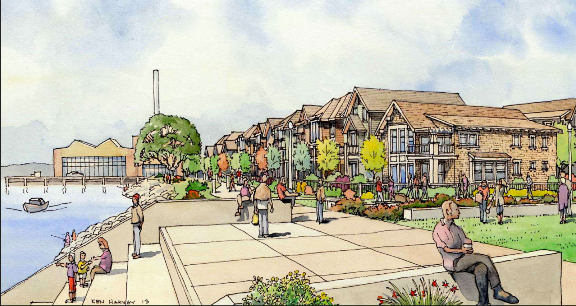
An eccentric developer, large amounts of cash, and the future of development in Richmond are coming to a head around a controversial ballot initiative and housing development proposal that could have lasting effects on the city’s General Plan.
The controversy surrounds a proposed suburban-style development called the Richmond Riviera that would be built on a 4.9 acre plot of land just East of the Craneway Pavilion. Current zoning for the site calls for high-density commercial and residential development on the site. The ballot initiative would change this zoning to allow for lower density zoning to accommodate the project.
Such a shift could reduce the potential for affordable housing in the city and reduce the feasibility of the ferry line that will connect Richmond to San Francisco.
The current owner of the land and developer to-be Richard Poe has pushed for this development in unconventional ways. Namely, Poe is circumventing the design and environmental requirements of Richmond’s General Plan by pushing for approval of his development and change to the General Plan through a ballot initiative that will likely come before voters in June 2016.
City planners believe that this proposal could derail goals for development and set a dangerous precedent for approving changes to the City's General Plan without the collaborative community input that initially went into the Plan's development.
“The General Plan was the result of a five-year process and hundreds of meetings across the city,” Richard Mitchell, Director for Planning and Building for the City, said at a recent discussion on the proposal during City Council. The purpose of the General Plan is for the city to lay out its vision of development for the city that is based on the needs and goals of the community, Mitchell explained.
In the development of the city’s General Plan, three key locations — Hilltop, downtown, and this five-acre plot — were identified as areas for higher density, commercial and residential development than what is allowed elsewhere in the city.
Each of these high activity zones were selected for their particular positions in Richmond. The plot of land in question is a key resource to the city’s future development
“This location is important because it’s Richmond’s southern waterfront gateway,” Mitchell said.
The plot of land in question is one of the last undeveloped spaces in a transforming neighborhood. A ferry line connecting Richmond to San Francisco, that will dock nearby around the Craneway Pavilion, is scheduled to open in the next two years. The UC Berkeley Global Campus, a project that will change the face of southern Richmond, is poised to break ground next year. A new overarching transportation and development plan was recently approved by city council.
At a time when this neighborhood is transforming, Mitchell explains, “this proposal is inconsistent with numerous policies.”
Current General Plan guidelines could accommodate between 50 and 125 dwelling units per acre, while the Richmond Riviera would have around 12 units per acre.
According to the Richmond Planning Department, such a shift could inhibit the city’s ability to meet it’s Regional Housing Needs Allocation, which is the City’s obligation to provide its share of housing in the area.
“When we were processing the 59 unit project I thought it did conform to the General Plan,” Poe said in a recent email. “Then we were told it didn't meet the General Plan vision…”
When asked why he wanted to pursue the development through the ballot initiative, Poe said “After three years, is that really a question?”
Poe is getting creative to secure its approval after years of pushing for the project. The developer recently brought an extra large novelty-sized check for $2 million to a meeting of Richmond City Council. Poe would give it to the City, he said, if his proposal was approved then and there. The Council didn’t take him up on the offer.
Another of the city’s main concerns of the initiative is that it flies in the face of the democratic process around developing a general plan and development goals in Richmond.
“If this initiative is approved, the project is approved absolutely as it is described here,” the head of the Planning Department said. “There will be no Planning Commission, no design review, there will be no community input, no council review, no nothing.”
If approved by voters, the City would have no power to order an environmental review of Poe’s proposed development, though the developer has said he would do one voluntarily.
It is expected that on Tuesday city council will put the initiative on the ballot for voters in a special election in June 2016. From there, it will be up to Richmond voters to determine the future of development in the city.
Voters to Determine Future of Development in Richmond
http://www.radiofreerichmond.com/tags/richmond_riviera
By: Sean Pyles
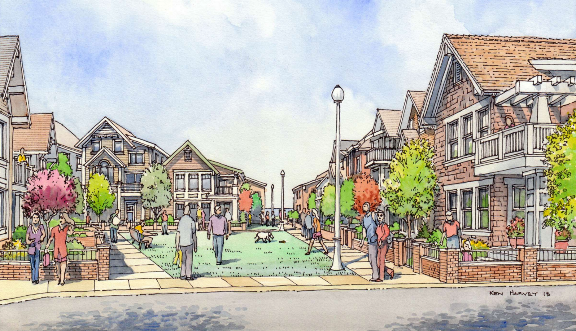
A controversial initiative that would bring a suburban-style development to Richmond’s waterfront and long-lasting changes to the city’s General Plan is now in the hands of voters after a unanimous decision from the Richmond City Council Tuesday night.
The proposed development, called the Richmond Riviera, would bring a 59-unit complex to an area currently slated for high-density development.
In order to bypass Planning Department regulation that would prohibit such construction, Richard Poe, the owner of Virtual Development Solutions, the development company behind the plan, decided to put the fate of his project in a ballot initiative that would at once change General Plan zoning for the area to allow for his project and confirm its approval.
The petition for the initiative gathered the requisite signatures, and it was up to City Council on Tuesday to either approve the proposal then, or put it to the voters.
“I do not think that a General Plan amendment should be put forth from a ballot measure,” said Councilmember Gayle McLaughlin Tuesday.
Councilmember McLaughlin elaborated that she would not support a ballot initiative that was not grassroots in nature. “When you see a developer trying to get his way with a particular development, and you see him bypassing the planning commission…you have a situation that is not in the favor of the people of Richmond,” she said.
The developer was not in attendance at the meeting Tuesday, but he recently explained that his move to push for a ballot initiative came after more than three years of frustrating back and forth with the City’s Planning Department.
The vote on this initiative is scheduled to place in tandem with the Presidential primary election, on June 7 of next year.
Read more: Controversial Development at Odds with General Plan
Richmond Confidential
http://richmondconfidential.org/2015/02/26/backers-of-a-flyer-campaign-and-ballot-initiative-proposal-criticize-city-managers-salary/
Backers of a flyer campaign and ballot initiative proposal criticize city manager’s salary
Mailers from the Richmond Small Business Association accuse City Manager Bill Lindsay of receiving a salary higher than
California Governor Jerry Brown and of mismanaging the city. (Photo provided by Richmond resident Joe Health)
By Larry ZhouPosted February 26, 2015 12:49 pm
Two weeks ago, Richmond residents discovered in their mailboxes large flyers titled “Call the Mayor.” The mailers accused City Manager Bill Lindsay, who has served in that position since 2005, of receiving a salary higher than California Governor Jerry Brown and of mismanaging the city. A few days later, a ballot initiative that called for amending the municipal code to regulate Lindsay’s salary was also submitted to the City Clerk’s office.
The flyers put Lindsay’s photo right next to Brown’s. Below the photos were their 2013 incomes representing their total salaries and benefits. According to the flyer, the total for Jerry Brown: $176,142. For Bill Lindsay: $411,972. The flyer asks Richmond residents: “What do you think?”
The mailers also contained excerpted phrases from news stories that question how well Richmond is managed. On the back of the flyers, it asks: “The City Manager’s contract expires in February 2016. Should it be renewed?”
Right away, residents were puzzled over two things: Who sent the flyers, and could those numbers be correct?
The income figures used for Brown and Lindsay on the flyers were attributed to Transparent California, a website that provides information on the compensation of public employees in California by filing public records act requests. According to the Transparent California website, in 2013 Lindsay made $288,372 in wages plus $123,600 in total benefits, which adds up to a total of $411, 972.
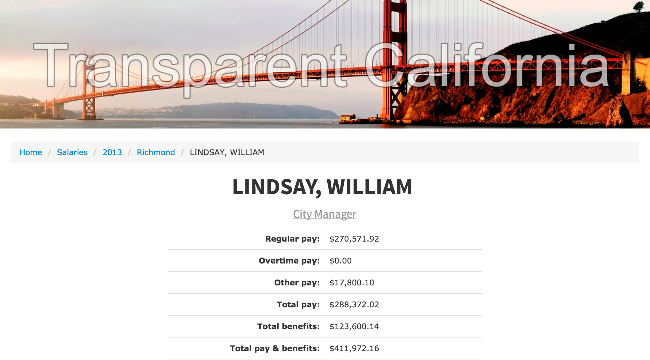
According to the Transparent California website, in 2013 Lindsay made $288,372 in wages plus $123,600 in total benefits, which adds up to a total of $411, 972. Screenshot taken February 26, 2015.
But those numbers do not match the salary figures for Lindsay on record at the California State Controller’s Office. According to the Controller’s Office, Lindsay made $288,372 in wages and received $90,510 in retirement and health benefits in 2013. Using this lower figure for benefits results in a lower total than the one used on the flyer: $378,882.
According to the Controller’s Office, Lindsay made $288,372 in wages and received $90,510 in retirement and health benefits in 2013. Using this lower figure for benefits results in a lower total than the one used on the flyer: $378,882. Screenshot taken February 26, 2015.
After being alerted of the $30,000 discrepancy, Robert Fellner, project manager at Transparent California, followed up with the city to obtain a breakdown of figures. Part of the difference, about $7,000, was likely due to the inclusion of statutory benefits, or employer-paid benefits such as life or disability insurance, he wrote to Richmond Confidential by email. In a phone interview, Fellner said that his group typically does not report statutory benefits as benefits because the State Controller’s Office doesn’t, and they “essentially just piggyback off the Controller.”
Shannon Moore from the Richmond City Attorney’s Office confirmed via email that the discrepancy comes from statutory benefits. “As I understand it, the State Controller’s report asks for Medicare wages and Transparent California numbers includes benefits such as life insurance, long-term disability, etc.”
But Fellner thought statutory benefits alone would not account for the discrepancy, and that there might have been an accounting error. He said his agency would continue to work with the city, and would correct their files if the city could confirm an error.
A group called the Richmond Small Business Association is responsible for the mailers. Contra Costa County Fictitious Business Name records show that the Marina Bay development company Virtual Development owns the Richmond Small Business Association.
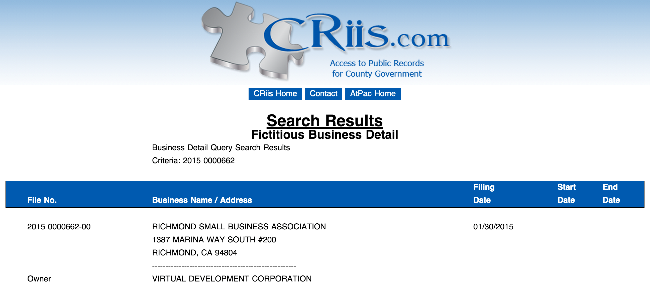
Contra Costa County Fictitious Business Name records show that the Marina Bay development company Virtual Development owns the Richmond Small Business Association. Screenshot taken February 26, 2015.
The development company’s founder, Richard Poe, confirmed via email that he is the founder of the Richmond Small Business Association. By email, Poe said that the person who filed the ballot initiative paperwork, Fritz Kunze, is a member of the association. According to Poe, the association aims to “to help our elected officials get the Richmond general fund in balance and allow Richmond to prosper.”
The Richmond Small Business Association’s online presence is limited to a website that only displays an exit poll the association commissioned after the November 4, 2014, municipal election. Poe declined to provide membership information about the organization “due to the concerns of reprisals.” But Poe said via email that the association sent out mailers because they are worried about the financial future of Richmond. “I share the concerns of my associates about the high salaries of our city manager and certain department heads of the under performing city,” Poe wrote. He’s especially concerned about the salary and benefits paid to City Manager Lindsay, Housing Authority Executive Director Tim Jones and Planning Director Richard Mitchell, Poe wrote.
“This concern of ever rising salaries of a city combined with a total pension debt of $415,441,600 which totals 180% of revenue, is a prescription for disaster,” Poe wrote. “Since pensions are tied to salaries, as salaries rise pensions rise with them. The growing burden has crippled other cities, such as Stockton, CA, which went into bankruptcy. Currently, Richmond’s CalPERS pension has a $214 million unfunded liability. We feel the voters should weigh in on the salary question in a special election.”
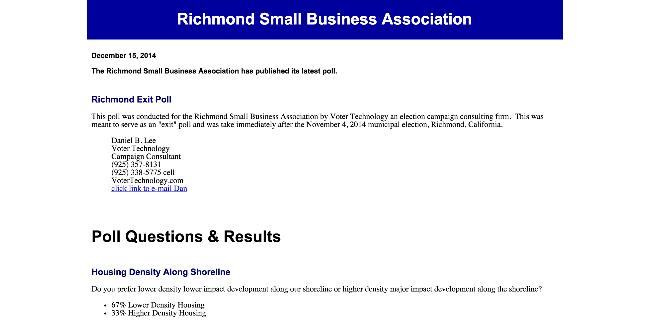
The Richmond Small Business Association’s online presence is limited to a website that only displays an exit poll the association commissioned after the November 4, 2014, municipal election. Screenshot taken February 26, 2015.
In addition to sending out mailers, the Richmond Small Business Association was also involved in the ballot initiative effort. According to Deputy City Clerk Pam Christian, a Notice of Intent for a ballot initiative proposing an amendment to the Richmond Municipal Code to regulate compensation levels for city officials and employees was submitted to her office on February 10 by Kunze, a registered voter in Richmond. “The executive board of the Richmond Small Business Association met prior to the filing by Fritz Kunze and supported his efforts,” Poe confirmed by email.
In his Notice of Intent paperwork, Kunze wrote that questions should be directed to his lawyer, Thomas Hiltachk. But as of press time, Hiltachk had not replied to emails requesting more information about his client.
The ballot initiative aims to “establish a mechanism by which the City Council shall set the compensation levels for City officials and employees,” according to the notice filed by Kunze. The stated reason for the initiative is that city officials and employees are making too much money: “City officials and employees earned a median salary of approximately $100,000 in 2013, almost double the median household income of Richmond residents,” according to the notice.
The notice targets the city manager’s salary and benefits specifically, saying that Lindsay “receives roughly seven times more than the median household income of Richmond residents,” “three times the salary and benefits of the Governor of the State of California” and argues that he “is paid even more than city managers in surrounding cities with larger populations.”
The mailers outraged many in Richmond, who credit the popular city manager with a Richmond renaissance, and who took to Internet comment boards to voice their opinions. “Bill Lindsay is priceless and deserves every nickel he earns,” Richmond resident Bryan Patrick Delaney commented on the Facebook group realRich. “Bill sat on the founding steering committee of the RYSE Center. He always brought integrity to the work and relationships,” RYSE center founder Kimberly Aceves commented on the Facebook group “Don’t Mess with Bill Lindsay.”
Richmond Police Chief Chris Magnus, whom Lindsay hired in 2006, is very vocal about his support for Lindsay. “Can’t help but wonder how many really dedicated and hard working department heads in Richmond would start looking around for new jobs if Bill Lindsay was driven out of his job by one self-serving and wealthy developer who is deliberately misleading the public,” Magnus commented on the Facebook group “Don’t mess with Bill Lindsay.”
And in a phone interview, Mayor Tom Butt said that comparing Lindsay’s income to the governor’s doesn’t make much sense. “The governor gets a lot of perks beyond what his salary is. He gets housing, he gets cars, he gets airplanes,” Butt said. “If you add up the value of all of that, I’m sure it will be a lot more than any city manager in California makes.”
Butt also said it’s important to “compare each position with its comparable positions,” such as city manager to city manager and governor to governor.
According to the State Controller’s Office, Lindsay made $288,372 in wages and $90,510 in retirement and health benefits in 2013. During the same time, Vallejo’s city manager made $314,629 in wages and $79,891 in benefits, Berkeley’s city manager made $224,999 and $76,799 respectively, Walnut Creek’s city manager made $226,372 and $49,641 and Concord’s city manager made $244,146 and $98,437, according to State Controller’s Office. This puts Lindsay’s remuneration on the high end of the scale, but not at the top.
“Richmond is a more complex and challenging city to govern than these other cities,” Butt said. For example, he said, Richmond operates a port, but many other cities don’t. Richmond also has a higher crime rate compared to other Bay Area cities. He said that “being creative and continuing to bring that [crime rate] down is a huge challenge, and it takes a special city manager to do it.”
Butt also doesn’t agree with Poe that the city’s pension fund is an issue related to Lindsay’s salary. “All cities, counties in the state of California have significant unfunded pension fund debt,” Butt said. “It’s a problem that’s going to be addressed on the statewide basis. Richmond is going to have unfunded pension obligations regardless of who the city manager is, what they pay the city manager.”
Butt said the Richmond Small Business Association is Poe’s one-man band. “When people talk about an association, the usual connotation is that it is a group of people,” Butt said. “But the Richmond Small Business Association essentially is just Richard Poe.”
In his e-forum newsletter, Butt speculated that there was another reason for the Small Business Association flyers criticizing Lindsay’s salary: “A good guess is that it relates to his [Poe’s] often professed frustration with the processing of his application for approval of the Richmond Riviera project.”
According to a Planning and Building Service Department staff report submitted to Richmond’s Design Review Board for the meeting on February 25, Richmond Riveria is a housing project proposed by Virtual Development Corporation on a vacant 4.92-acre site located on Marina Way South in the Richmond Marina neighborhood. It’s right next to the Ford Assembly Building. Poe’s Virtual Development Corporation proposes to develop the site with 59 single-family detached homes.
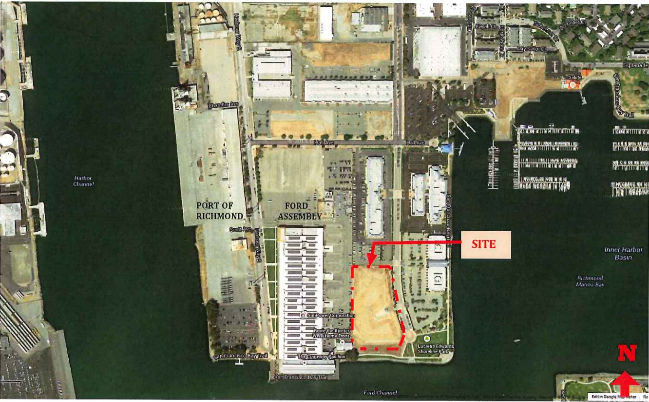
Aerial photograph of the Richmond Riviera site from the staff report.
The site “is designated under the 2030 General Plan as an Activity Center site,” according to the staff report. One of the reasons for such designation was to “encourage high-density projects to take advantage of the site’s proximity to the Ferry Terminal.” The staff report says Virtual Development proposed 12 dwelling units per acre, which “conforms to the wording of the General Plan.” But in the report, the Planning and Building Service Department staff recommends to the Design Review Board that “the project be substantially modified.”
Butt said that he has known Poe for years. Poe has been a contributor to Butt’s campaign and Butt’s architecture company has done some work for Poe, Butt said. “I don’t have any beef with Poe,” Butt said. “This is more about me defending my city manager than picking a fight with Richard.”
Poe responded via email calling Butt’s guess about Richmond Riviera “unfounded speculations,” and saying Butt should retract the title of newsletter he sent out that states “Richard Poe Files Notice of Intent to Circulate Petition Limiting City Manager Compensation” because he did not file the notice.
Lindsay declined to comment for this story.
|
|

